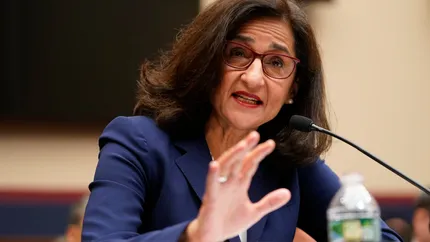In a significant leadership change, the president of Columbia University has announced their resignation following months of intense protests related to the Israel-Hamas conflict. The campus has been a focal point for heated debates and demonstrations, highlighting the ongoing tensions and the university’s role in addressing global issues. This leadership transition marks a pivotal moment for the institution as it navigates these challenging times.
Minouche Shafik, president of Columbia University in New York City, announced her resignation on Wednesday following intense scrutiny over her management of pro-Palestinian protests earlier this year. These demonstrations positioned the university at the center of a broader national debate on the Israel-Hamas conflict.

Shafik’s departure marks a significant shift in leadership and makes her the latest Ivy League president to step down amid growing campus controversies linked to the conflict, especially in urban areas like New York City. The protests at Columbia last semester have sparked similar demonstrations across the country.
In her resignation email to students and faculty, Shafik acknowledged the personal toll the situation has taken. “This period has been challenging for my family, as it has for many in our community,” she wrote. “After reflecting over the summer, I believe stepping down now will allow Columbia to better navigate the challenges that lie ahead.”
Minouche Shafik, a former World Bank official, revealed on Wednesday that she has been invited by the United Kingdom’s foreign secretary to take on a high-ranking government position, prompting her decision to return to England.
Shafik’s resignation follows a trend among Ivy League leaders, including Harvard’s Claudine Gay and the University of Pennsylvania’s Liz Magill, who also faced significant pressure after testifying before Congress. Shafik’s testimony in April similarly placed her in a difficult situation. Harvard’s Claudine Gay resigned in January after just six months in her role, while Liz Magill stepped down shortly after serving just over a year, following their summons to Washington by Republican lawmakers last December.
As the spring semester drew to a close, Minouche Shafik’s efforts to address bipartisan concerns about antisemitism at Columbia University unexpectedly escalated tensions. Her response to the situation, particularly after her congressional testimony, sparked a wave of anti-Zionist protests on campus. Demonstrators flooded the university lawns, demanding that Columbia sever all ties with Israel. Shafik condemned the protests, stating that they violated university policies and posed a “clear and present danger.” In response, she called in the New York City Police Department, resulting in the arrest of over 100 protestors.
Later that month, when campus protestors occupied an academic building, Minouche Shafik once again called law enforcement to intervene, despite having previously stated that she had no intention of involving the police in managing student dissent over the Middle East conflict. This reversal in her approach further intensified the already charged atmosphere on campus.
Katrina Armstrong, the CEO of Columbia University Irving Medical Center, has been appointed as the university’s interim president, according to an email from the board of trustees sent on Wednesday night.
“We believe that Katrina is the right leader for this moment,” the board stated. “We are grateful to her for stepping in, and we call on our community to support her.”
In response to Shafik’s resignation, House Speaker Mike Johnson released a statement late Wednesday, describing her departure as “long overdue.”
“We hope that President Shafik’s resignation serves as a warning to university administrators nationwide that tolerating or protecting antisemitism is unacceptable and will have serious consequences,” Johnson said. “Jewish students at Columbia starting this school year should feel a sense of relief.”
For more insights and updates on university leadership changes and campus developments, explore our related articles on Digital Digest. Stay informed with the latest news and in-depth analysis at Digital Digest.






